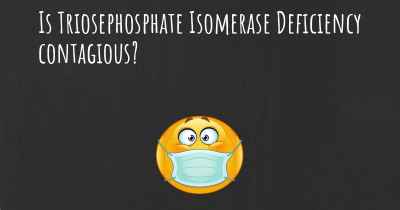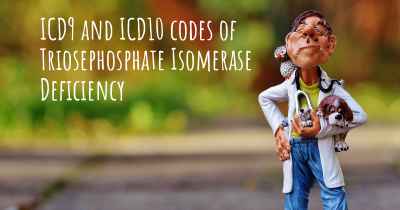Is Triosephosphate Isomerase Deficiency hereditary?
Here you can see if Triosephosphate Isomerase Deficiency can be hereditary. Do you have any genetic components? Does any member of your family have Triosephosphate Isomerase Deficiency or may be more predisposed to developing the condition?

Triosephosphate Isomerase Deficiency is a rare genetic disorder that affects the enzyme triosephosphate isomerase. It is inherited in an autosomal recessive manner, meaning that both parents must carry a mutated gene for the condition to be passed on to their child. The mutated gene affects the production of the triosephosphate isomerase enzyme, leading to a range of symptoms. Genetic counseling and testing can help determine the risk of inheriting this condition.
Triosephosphate Isomerase Deficiency (TPI deficiency) is a rare genetic disorder that affects the metabolism of glucose in the body. It is caused by mutations in the TPI1 gene, which is responsible for producing the enzyme triosephosphate isomerase. This enzyme plays a crucial role in the breakdown of glucose for energy production.
TPI deficiency is inherited in an autosomal recessive manner, which means that both parents must carry a copy of the mutated gene for their child to be affected. When both parents are carriers, there is a 25% chance with each pregnancy that the child will inherit two copies of the mutated gene and develop TPI deficiency.
Since TPI deficiency is a genetic disorder, it can be passed down through generations within families. If both parents are carriers, each of their children has a 50% chance of being a carrier and a 25% chance of being affected by the disorder.
It is important for individuals with a family history of TPI deficiency to consider genetic counseling before planning a pregnancy. Genetic counseling can help assess the risk of passing on the disorder and provide information about available testing options.
Early diagnosis and management of TPI deficiency are crucial for optimizing outcomes. Symptoms of TPI deficiency can vary widely, ranging from mild to severe, and may include neurological problems, muscle weakness, developmental delays, and anemia. Genetic testing can confirm the diagnosis.
While there is currently no cure for TPI deficiency, treatment focuses on managing symptoms and providing supportive care. This may include physical therapy, occupational therapy, and medications to alleviate specific symptoms.
In conclusion, Triosephosphate Isomerase Deficiency is a hereditary disorder caused by mutations in the TPI1 gene. It is inherited in an autosomal recessive manner and can be passed down through generations within families. Genetic counseling is recommended for individuals with a family history of TPI deficiency, and early diagnosis and management are essential for optimizing outcomes.








